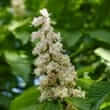Background
- Horse chestnut seed extract (HCSE) is widely used in Europe for chronic venous insufficiency (CVI), a syndrome that may include leg swelling, varicose veins, leg pain, itching, and skin ulcers. Although HCSE is traditionally recommended for a variety of medical conditions, CVI is the only condition for which there is strong supportive scientific evidence.
- Side effects from HCSE have been similar to placebo in clinical trials. However, due to an increased risk of low blood sugar, caution is advised in children and people with diabetes.
References
Natural Standard developed the above evidence-based information based on a thorough systematic review of the available scientific articles. For comprehensive information about alternative and complementary therapies on the professional level, go to . Selected references are listed below.
- Bassler D, Okpanyi S, Schrodter A, et al. Bioavailability of beta-aescin from horse chestnut seed extract: comparative clinical studies of two Galenic formulations. Adv Ther 2003 Sep-Oct;20(5):295-304.
View Abstract - Bielanski TE, Piotrowski ZH. Horse-chestnut seed extract for chronic venous insufficiency. J Fam Pract 1999 Mar;48(3):171-2.
View Abstract - Comaish JS, Kersey PJ. Contact dermatitis to extract of horse chestnut (esculin). Contact Dermatitis 1980 Jan;6(2):150-1.
View Abstract - Diehm C, Trampisch HJ, Lange S, et al. Comparison of leg compression stocking and oral horse-chestnut seed extract therapy in patients with chronic venous insufficiency. Lancet 2-3-1996;347(8997):292-294.
View Abstract - Diehm C, Vollbrecht D, Amendt K, et al. Medical edema protection--clinical benefit in patients with chronic deep vein incompetence. A placebo controlled double blind study. Vasa 1992;21(2):188-192.
View Abstract - Ernst E, Pittler MH, Stevinson C. Complementary/alternative medicine in dermatology: evidence-assessed efficacy of two diseases and two treatments. Am J Clin Dermatol 2002;3(5):341-8.
View Abstract - Koch R. Comparative study of Venostasin and Pycnogenol in chronic venous insufficiency. Phytother Res 2002;16 Suppl 1:S1-5.
View Abstract - Lange S, Freitag G, Trampisch HJ. Practical experience with the design and analysis of a three-armed equivalence study. Eur J Clin Pharmacol. 1998 Sep;54(7):535-40.
View Abstract - Ottillinger B, Greeske K. Rational therapy of chronic venous insufficiency--chances and limits of the therapeutic use of horse-chestnut seeds extract. BMC Cardiovasc Disord 2001;1(1):5.
View Abstract - Pittler MH, Ernst E. Horse chestnut seed extract for chronic venous insufficiency. Cochrane Database Syst Rev 2006 Jan 25;(1):CD003230.
View Abstract - Popp W, Horak F, Jager S, et al. Horse chestnut (Aesculus hippocastanum) pollen: a frequent cause of allergic sensitization in urban children. Allergy 1992 Aug;47(4 Pt 2):380-3.
View Abstract - Rehn D, Unkauf M, Klein P, et al. Comparative clinical efficacy and tolerability of oxerutins and horse chestnut extract in patients with chronic venous insufficiency. Arzneimittelforschung 1996;46(5):483-487.
View Abstract - Siebert U, Brach M, Sroczynski G, et al. Efficacy, routine effectiveness, and safety of horsechestnut seed extract in the treatment of chronic venous insufficiency. A meta-analysis of randomized controlled trials and large observational studies. Int Angiol 2002;21(4):305-315.
View Abstract - Suter A, Bommer S, Rechner J. Treatment of patients with venous insufficiency with fresh plant horse chestnut seed extract: a review of 5 clinical studies. Adv Ther 2006 Jan-Feb;23(1):179-90.
View Abstract - Vayssairat M, Debure C, Maurel A, et al. Horse-chestnut seed extract for chronic venous insufficiency. Lancet 4-27-1996;347(9009):1182.
View Abstract







